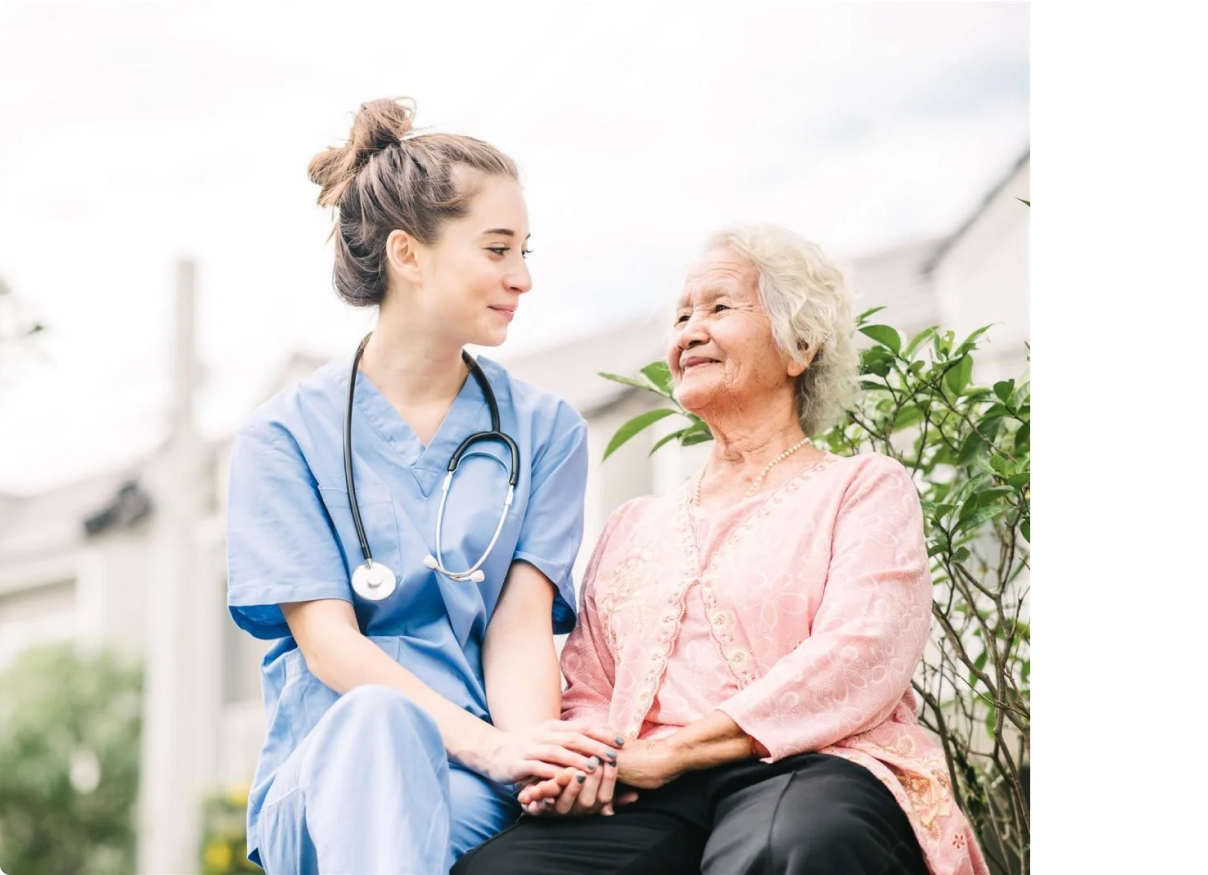Help Reverse Cognitive Decline with
Bredesen Protocol Alzheimers Treatment in George Mason, VA
There's no way around it: Getting diagnosed with Alzheimer's disease can be both scary and disheartening for patients and their loved ones. The cognitive impairment, memory loss, and eventual cognitive decline can seem like a grim prognosis. Unfortunately, the standard reductionist approach seeking to identify a single silver bullet cure doesn't account for the multifactorial nature of Alzheimer's disease.
That's why treating Alzheimer's disease requires a multifaceted response from functional medicine. While there is no single drug that can cure Alzheimer's, protocols addressing the nuanced factors contributing to the disease can make a difference. That's where Proactive Wellness Centers and Bredesen protocol treatment in George Mason, VA comes into play.
Service Areas

The Proactive Wellness Approach to Brain Health
At Proactive Wellness, we firmly believe that brain health is an essential part of your overall well-being. However, despite the emergence of new research, there has been limited understanding of how to promote brain health effectively. This includes reducing the risk of dementia/Alzheimer's and stabilizing cognitive decline in patients with early symptoms. Dr. Lawson, an esteemed Bredesen Protocol practitioner and ReCode 2.0 Certified with 17 years of experience in functional medicine can identify and address the root cause of cognitive decline in you or your loved one.
Dr. Lawson's goal isn't to replace the role of family physicians. Rather, we collaborate with primary care physicians, internists, and other medical professionals to provide a comprehensive approach to care. We believe that every individual is unique from a physiological perspective, and therefore, we avoid a one-size-fits-all approach. Instead, our programs focus on a customized approach, addressing risk factors that, if avoided or modified, could have beneficial effects for men and women who have dementia.
Our programs have a strong emphasis on slowing down and reversing the aging process, preventing diseases, and treating chronically ill patients. To achieve this, we employ a three-pronged approach:
- We empower patients with the knowledge they need to manage their health and attain optimal well-being.
- We prioritize disease prevention by conducting a thorough evaluation with the help of comprehensive diagnostics and the patient's health history form.
- We collaborate with patients to implement a rejuvenation program that includes various science-based treatments, like our Brain Health Optimization Program (BHOP) for people suffering from dementia and Alzheimer's
One of the most popular and effective programs we offer includes Bredesen protocol treatment in George Mason VA. This revolutionary approach to dementia has provided hope and improved cognitive function for countless people in the US. But to understand the importance of the Bredesen protocol, it's important that you first understand dementia, Alzheimer's, and its effect on people across the world.
The Wide-Reaching Effects of
Alzheimer's Disease and Dementia
There are currently more than 5.8 million individuals in the United States who are living with Alzheimer's disease. It is predicted that the number of individuals with Alzheimer's disease will more than double by 2050.
Dementia is a type of cognitive decline that affects mental abilities. There are many different causes and complex layers involved. Cognitive impairment is characterized by abnormal results on tests measuring memory, speech, critical thinking, and other cognitive abilities, but individuals with this diagnosis are still capable of performing daily activities such as bathing, dressing, and eating. Without proper treatment, Alzheimer's disease is likely to follow within a few years. Alzheimer's disease is the most prevalent form of dementia, and it is diagnosed through neuro-imaging and analysis of cerebrospinal fluid.
In the past, being diagnosed with Alzheimer's was often worse than receiving a death sentence. It was dehumanizing and stripped individuals of their memories, thinking abilities, and independence. However, after three decades of research, we now have a greater understanding of this devastating illness and even solutions like Bredesen protocol treatment in George Mason, VA that can help patients deal with dementia.

What Causes Dementia? 
Dementia is caused by a normal and healthy brain process that malfunctions due to a toxic environment, inflammation, and a lack of necessary nutrients and hormones. The brain's defense mechanism produces amyloid plaques, which serve as a protective helmet around the brain. Unfortunately, these plaques destroy connections between nerve cells, ultimately affecting comprehension, recollection, and clarity.

Dementia by the Numbers 
It's important to understand the impact of Alzheimer's disease (AD) around the world. According to the CDC, AD is present in 50% of patients in nursing homes and causes more than 110,000 deaths annually in the US. It was the 6th leading cause of death in 2015. More than 5 million people in the US are affected by AD, and recent data indicates that the problem is getting worse.
According to the World Health Organization (WHO), 47 million people around the world are currently living with dementia, and this number is expected to rise to 75 million by 2030 and 132 million by 2050. Alzheimer's disease is the most common form of dementia, accounting for 60 to 80 percent of all cases.
While reading those statistics can be disheartening, there's reason to be hopeful. New therapies and treatments offered at Proactive Wellness - like Bredesen protocol treatment - can help patients deal with dementia and cognitive decline.

The Power of
Bredesen Protocol Treatment in George Mason, VA
The Bredesen Protocol is a highly personalized treatment program that aims to reverse cognitive decline and improve brain function in patients. Dr. Bredesen has designed the protocol to be adaptable and customizable, tailored to the specific symptoms and needs of each patient.
The program is centered around lifestyle changes, medication, and nutritional adjustments, all of which are tailored to address the unique symptoms and environmental factors that may be contributing to cognitive decline. This approach, referred to as ReCODE, helps patients to combat brain fog and prevent the onset of dementia.
It has also helped patients improve cognitive function significantly, reverse symptoms, and even return to work. The ReCODE program comprises lifestyle interventions, therapeutic diets, and targeted nutrients. Proactive Wellness Centers is thrilled to offer this promising treatment modality for Alzheimer's disease to benefit our patients.
It all starts with a baseline Bredesen evaluation at our wellness clinic in George Mason, VA.
Baseline Bredesen Evaluation from
Proactive Wellness Centers
At Proactive Wellness Centers, we have two ways to help patients who are in search of Bredesen protocol treatment in George Mason, VA. The first option is our Baseline Bredesen Evaluation, which is best suited for asymptomatic patients - that is, individuals who do not exhibit any significant cognitive decline beyond what is expected with age. Dr. Bredesen classifies such patients as "PreCode."
This evaluation serves as a starting point for PreCode patients, as well as those who are unsure of their cognitive status and potential risk factors. Our baseline evaluation includes the following:
The first step involves conducting a comprehensive set of baseline labs to evaluate your overall health, closely following the Bredesen protocol. This step goes beyond standard labs that you might have for a physical. It includes tests for magnesium, zinc, and selenium levels, B6, B12, and folate levels, omega-3 and omega-6 fatty acid levels.
It also includes
- Pre-Diabetes Evaluation
- Hormone Level Evaluation
- Thyroid Level Evaluation
- Specific Immune Marker Evaluation such as TH1, TH2, IL6, and TNF.
Our goal with this assessment is to establish a starting point and compare your cognitive function against what is typical for your age group. We have chosen to use the CNS Vital Signs cognitive assessment, which is widely recognized as one of the best in the industry. Additionally, we will be conducting the standard MoCA test as part of the evaluation.
A DNA test is performed to identify the specific APOE genotype present in your DNA. APOE e4 has been shown to be associated with an increased chance of late-onset Alzheimer's disease, which occurs after a person is 65 years old.
This step covers your lab results and includes a detailed plan of action to address areas of improvement as identified in your baseline evaluation.

What are the Early Signs of
Dementia and Alzheimer's Disease?
As we grow older, it can be difficult to distinguish between normal changes in our cognitive abilities and the initial signs of dementia. The issue with preventing chronic illnesses is that we often believe we are healthy as long as we don't experience any symptoms, but this is not entirely accurate. Symptoms are typically the last indicator of a disease, meaning it has already progressed by the time they appear.
While it's always best to catch diseases before you notice symptoms, taking proactive measures at the first sign of cognitive changes can greatly impact the aging of your brain and body. It's crucial to act immediately if you're experiencing the following symptoms of Mild Cognitive Impairment. That way, ,you have a better chance of preventing the development of Alzheimer's.

Roughly 10% of individuals with MCI progress to Alzheimer's annually.
Fortunately, Bredesen protocol treatment in George Mason, VA may provide you with a chance to delay or even reverse these symptoms

Memory Issues
You have a hard time remembering events that happened recently, such as appointments or important conversations with loved ones. You may also have trouble remembering important information.

Language Issues
You have trouble finding relevant words when you're talking with other people. You may also have problems following along with complex or complicated discussions.

Difficulty Maintaining Concentration and Attention
You have noticed a reduced ability to focus and stay honed in on most tasks. You may also not be able to multitask effectively, and it may be harder to keep your attention for long periods of time.

Decline in Executive Functions
This symptom involves difficulty with skills like decision-making, planning, problem-solving, and organizing. These difficulties are often most apparent in day-to-day activities.

Problems with Visuospatial Awareness
You may have trouble parking your car, judging distances, reading maps, or completing tasks that necessitate spatial orientation.

Impaired Judgement and Reasoning
This may include problems when making judgments or decisions. Examples may consist of difficulties making financial decisions, managing finances, making reasonable and appropriate social decisions, or thinking through risky situations.

By contrast, some of the most common signs of normal aging can include the following
Experiencing temporary lapses in memory, where recently learned details like names or scheduled events may slip from one's mind but can be remembered later on
- You occasionally make mistakes, but nothing that stands out as significant or unusual.
- You have to ask for help putting together or setting up electronic devices or equipment.
- You sometimes forget what day it is but have the ability to remember the correct date later on.
- Your vision is getting worse, which is caused by cataracts.
- You experience shortness of breath or get tired more often when being active.
- You feel unusual aches and pains, especially during poor weather.
- You get confused sometimes but don't have an inability to make decisions or multitask.
- You have a hard time keeping your body temp regulated.
- You get angry or frustrated when tasks aren't completed in certain ways.
Your Trusted Choice for Bredesen Protocol Treatment in George Mason, VA
Maintaining a healthy brain is crucial for one's overall well-being, yet there remains a lack of knowledge when it comes to promoting brain health, reducing the likelihood of dementia, or managing symptoms for those exhibiting early warning signs.
That's why we're excited to offer patients the ReCODE program at Proactive Wellness Centers. Developed by Doctor Bredesen, this treatment has shown remarkable success in improving cognitive function and even reversing symptoms of Alzheimer's disease. This comprehensive program includes lifestyle changes, dietary interventions, and specialized nutrients, and we are eager to provide this promising treatment option to patients like you.
If you or a loved one are starting to show concerning signs of cognitive decline, contact our office today to learn more about Bredesen protocol therapy. It could be your first step toward reversing mental decline and enjoying life to its fullest.
Latest News in George Mason, VA
George Mason University Completes Long-Term Rebrand With New Logo
atlantic10.comhttps://atlantic10.com/news/2024/4/25/about-the-atlantic-10-george-mason-university-completes-long-term-rebrand-with-new-logo.aspx
FAIRFAX, Va. – George Mason University unveiled a completely redesigned logo as the capstone of its three-year-long, comprehensive rebrand. The new look, which will include a single logo for the university and its athletics program, asserts George Mason's emerging identity as a national top 50 public university and Virginia's top-ranked university for innovation and upward mobility, as well as the commonwealth's largest, most innovative, and most diverse university.The ongoing rebrand signals George Mason's conv...
FAIRFAX, Va. – George Mason University unveiled a completely redesigned logo as the capstone of its three-year-long, comprehensive rebrand. The new look, which will include a single logo for the university and its athletics program, asserts George Mason's emerging identity as a national top 50 public university and Virginia's top-ranked university for innovation and upward mobility, as well as the commonwealth's largest, most innovative, and most diverse university.
The ongoing rebrand signals George Mason's convention-defying rise to become a leading national public research university by expanding access to excellence through an unwavering commitment to inclusive innovation. The rebrand rollout began in 2021, with preparations to mark 50 years of George Mason as a university in 2022 with updated brand narrative that proclaims the university's distinct approach to education as All Together Different. The logo system now matches this brand language.
"Higher education in America is at an inflection point, with families having a harder time finding a top-quality, affordable college education at a university that will actually admit them," said George Mason President Gregory Washington. "George Mason has always offered these things, but few families know of this value because our brand and message have not been adequately heard. This new look is our reintroduction to the community, and a symbol of our commitment to the fundamentals: outstanding and rigorous academics, pragmatic career preparation and internships, flexibility and value, and an atmosphere of belonging for everyone."
George Mason has grown from a small regional college in the 1970s into the youngest institution ever to earn Carnegie Tier 1 research university status, as well as Virginia's top-ranked university for such high-demand and varied disciplines as cybersecurity, business entrepreneurship, homeland security, criminology, and forensic sciences. It also established Virginia's first School of Computing in 2021 and its first College of Public Health in 2023.
"Our new brand crystallizes our identity as a great equalizer—a university committed to inclusive acceptance over exclusive status, and the promise of broad access to a top 50 university experience," Washington said. "We take great pride in opening our doors wider the higher we climb in prestige. That's what we mean by All Together Different."
"George Mason has always boxed above its weight in Northern Virginia and D.C., and it needs an identity system to compete in the most competitive higher education market in the nation," said Horace Blackman, rector of George Mason's Board of Visitors. "This identity system brings George Mason shoulder-to-shoulder with leading brands in higher education."
The new look also fixes several operational challenges with the existing logo system, and visuals that were difficult to maintain consistently across the university's complex academic environment. All university units will now use a single, streamlined logo system.
"I am thrilled that George Mason Athletics will lead the charge to a unified look that reflects the modern character of this great university," said Marvin Lewis, assistant vice president and director of Intercollegiate Athletics. "George Mason Athletics develops true scholar-athletes and serves as the front porch of the university, so it's important to promote one consistent identity to unify our community."
Input gathered from faculty and staff, students, parents, alumni, donors, and community leaders confirmed that George Mason is "All Together Different," and in need of a new logo system to unify the community. The new look features clean lines and open ends, symbolizing multiple entry points and pathways to success. An interior gold shape hugged by green on both sides depicts the university's signature diversity and inclusivity. The clean lines represent the university's efficiency and pragmatism.
The familiar green and gold color palette remains, paying homage to the university's origins, as those school colors were voted on by students in the late 1960s. However, bolder shades will be adopted to signify its confidence as a rising national leader.
The "GM" monogram distinguishes the university as the world's only university to use those initials in its logo and recognizes that the broader community commonly refers to the university as "George Mason," not just "Mason" and no longer "GMU."
"This is a new look for a new era with new expectations of American higher education," said Paul Allvin, vice president and chief brand officer at George Mason. "The rebrand reintroduces Mason as elite yet never elitist, prestigious yet eminently accessible, confident in blazing a fundamentally new path for public higher education in the 21st century and beyond."
The change to the new look is planned to happen over time and is being accomplished without additional university spending. Over the next two years, assets that can be converted at no cost, like digital displays, will be converted first, followed by branded materials that naturally run out periodically and are already budgeted for replacement. Durable assets including external signage will be paid for by reallocation of existing budgets within the Office of University Branding.
Full resolution photography and graphics are available here: https://go.gmu.edu/presskit2404 About George Mason University
George Mason University is Virginia's largest public research university. Located near Washington, D.C., Mason enrolls more than 40,000 students from 130 countries and all 50 states. Mason has grown rapidly over the past half-century and is recognized for its innovation and entrepreneurship, remarkable diversity, and commitment to accessibility. In 2023, the university launched Mason Now: Power the Possible, a one-billion-dollar comprehensive campaign to support student success, research, innovation, community, and stewardship. Learn more at gmu.edu.
Loudoun Schools To Take Part In New Lab School To Support Career Pathways
Emily Leaymanhttps://patch.com/virginia/ashburn/loudoun-schools-take-part-new-lab-school-gmu-nova
The lab school will serve Loudoun County Public Schools students to prepare them for high-demand jobs like information technology.Patch Staff|Updated Fri, May 3, 2024 at 12:48 pm ETLOUDOUN COUNTY, VA — To help students better understand career pathways after high school, Loudoun County Public Schools is participating in a new lab school with local higher education institutions....
The lab school will serve Loudoun County Public Schools students to prepare them for high-demand jobs like information technology.
Patch Staff
|Updated Fri, May 3, 2024 at 12:48 pm ET
LOUDOUN COUNTY, VA — To help students better understand career pathways after high school, Loudoun County Public Schools is participating in a new lab school with local higher education institutions.
Lab schools, a concept pushed by Virginia Gov. Glenn Youngkin with state start-up funds, are K-12 programs through higher education institutions to test innovative educational programs as well as provide new opportunities and career pathways to students. Lab schools are public schools through private or public higher education institutions and serve historically underserved students through a lottery selection process. The Virginia Board of Education approved six new lab schools in late April, including one through Northern Virginia's George Mason University.
Loudoun County Public Schools will join GMU's lab school program in partnership with Northern Virginia Community College. The LCPS-based program, called Accelerated College and Employability Skills (ACCESS) Academy, seeks to boost students' career pathways to high-demand careers such as information technology.
"ACCESS Academy will provide innovative educational experiences for students that will lead to certifications and two- and four-year degrees, as well as support students with access to high-demand and well-compensated jobs in the information technology fields," said LCPS Superintendent Aaron Spence in a statement. "We have heard loud and clear from our community that our students need alternative pathways to college. And this is just one way we are getting them there."
The ACCESS Academy will directly serve 11th and 12th grade students and include phased-in lab school preparation in 9th and 10th grades. According to LCPS, 9th and 10th grade students will focus on core graduation requirements like English, social studies, math and science and will start to work on employability skills and problem-based learning activities. Faculty will come from LCPS, George Mason University’s College of Education and Human Development and Information Technology Program, Northern Virginia Community College.
Find out what's happening in Ashburnwith free, real-time updates from Patch.
"Our focus on innovative, problem-based learning and skills needed for the future workforce will ensure students have robust wrap-around supports all the way through their education and early careers to build a better future for themselves and their communities," said Dean Ingrid Guerra-López of George Mason’s College of Education and Human Development.
The program will also include a new Learning Innovation Lab to evaluate new teaching and learning methods and provide training for current and future teachers, including teacher candidates, in-service teachers, and faculty in information technology and other areas.
The start date of the program has not been announced.
Get more local news delivered straight to your inbox. Sign up for free Patch newsletters and alerts.
New Mason Nanofabrication Facility will help drive innovation in the commonwealth
Katie Maneyhttps://www.gmu.edu/news/2024-01/new-mason-nanofabrication-facility-will-help-drive-innovation-commonwealth
Over the past decade, nanotechnology has taken the world by storm. From health care to electronics, it has radically transformed countless industries.As a result, nanofabrication, the manufacturing of nanoscale structures, is more important than ever, and proper fabrication has requirements, including both sophisticated equipment and a skilled workforce. In response to the rising demand for nanofabrication services, George Mason University stands ready to conduct state-of-the-art research and to help train the next generation of innov...
Over the past decade, nanotechnology has taken the world by storm. From health care to electronics, it has radically transformed countless industries.
As a result, nanofabrication, the manufacturing of nanoscale structures, is more important than ever, and proper fabrication has requirements, including both sophisticated equipment and a skilled workforce. In response to the rising demand for nanofabrication services, George Mason University stands ready to conduct state-of-the-art research and to help train the next generation of innovators with the opening of the new Nanofabrication Facility (NFF) on its Science and Technology Campus.
“The NFF is the only cleanroom facility and resource for partners in Northern Virginia and offers hands-on nanofabrication workforce training in groundbreaking research and emerging research applications that will accelerate growth of high-tech companies,” said Andre Marshall, vice president of research, innovation, and economic impact at Mason. “Mason is committed to providing many opportunities for students to participate in experiential learning, preparing our workforce for the future and readying them to compete on a global scale.”
Mason engineering professor Ethan Ahn sees the new facility as a perfect opportunity to give students the chance to receive hands-on experience in a nanofabrication lab. Ahn is teaching Mason’s first-ever Nanoelectronics Fundamentals course during the Spring 2024 semester, where students will be asked to create electronic devices in the NFF Class 1000 cleanroom.
“Hands-on experience in this field is invaluable, especially because students can become familiarized with the equipment that they may encounter in their future careers,” said Ahn, an associate professor in the Department of Electrical and Computer Engineering.
Mason also launched the Nano-IMAGINE program with the help of a $3.75 million grant from GO Virginia, a state-funded initiative administered by the Virginia Department of Housing and Community Development. Through Nano-IMAGINE, in addition to offering undergraduate and graduate courses, Mason plans to provide two workforce-readiness opportunities in 2024: Nanocamp and Nano Boot Camp.
Nanocamp will allow area high school students to take part in experiments designed by Mason researchers and industry experts that use the cutting-edge equipment found inside the NFF. Nano Boot Camp is designed for those who are searching for a new career path or who would like to gain entry-level skills in an in-demand field. Similar to Nanocamp, participants will learn and apply principles used to build micro and nano devices.
The Nano-IMAGINE courses and programs complement statewide efforts led by the newly established Virginia Alliance for Semiconductor Technology (VAST). VAST is a network of semiconductor, microelectronics, and nanotechnology industries and Virginia colleges and universities. As a member of this consortium, Mason aims to promote VAST by educating NFF boot camp members about opportunities offered by the alliance, such as certificate programs that can help advance their careers in nanofabrication, an essential part of the semiconductor field.
"By investing in top faculty, new programs and facilities, and partnerships, Mason is connecting learning and market advancement to drive innovation for all across the state," said Marshall. “We are leading regional collaborations across sectors to bring a better tomorrow.
Mason and AWS collaborate on Renewable Energy Lab and Sustainable Data Center Engineering concentration
George Mason Universityhttps://www.gmu.edu/news/2024-03/mason-and-aws-collaborate-renewable-energy-lab-and-sustainable-data-center-engineering
Mason and AWS collaborate on Renewable Energy Lab and Sustainable Data Center Engineering concentrationFairfax, Va. (March 4, 2024)—Working with Amazon Web Services (AWS), George Mason University will unveil a new Renewable Energy Lab within the soon-to-open Fuse at Mason Square in Arlington and launch a companion curriculum concentration in sustainable data center engineering this fall 2024.“We are very appreciative of our continuing collaboration with AWS,” Mason President G...
Mason and AWS collaborate on Renewable Energy Lab and Sustainable Data Center Engineering concentration
Fairfax, Va. (March 4, 2024)—Working with Amazon Web Services (AWS), George Mason University will unveil a new Renewable Energy Lab within the soon-to-open Fuse at Mason Square in Arlington and launch a companion curriculum concentration in sustainable data center engineering this fall 2024.
“We are very appreciative of our continuing collaboration with AWS,” Mason President Gregory Washington said. “Because of their support, we are providing our students and faculty with cutting-edge technology and tools that unite our researchers across many disciplines to further their knowledge about data centers. With this level of education and experience, our students are well-prepared to enter the tech workforce.”
“Investing in expanded laboratory experiences for students is critical,” Nicholas Lee-Romagnolo, program lead of workforce and economic development at AWS, said. “George Mason students from all disciplines will have access to real-world technologies and hands-on simulations. This type of immersive learning complements the breadth of new programs offered to students and helps ensure they have the opportunity to develop the skills needed to fill high-demand jobs across the region.”
The new concentration in sustainable data center engineering will focus on renewable energy generation, storage, and distribution training and hands-on experience. The course builds upon the Data Center Engineering course launched last year that develops student expertise in data center infrastructure design, operations, efficiency, cooling, and decarbonization.
With advanced equipment and software tools funded by AWS, Mason’s new Renewable Energy Lab will allow students to explore, analyze, and simulate data related to renewable energy sources as well as the complex design and operation of microgrids. The lab will replicate real-world equipment, such as power grids, wind power plants, and other renewable energy sources.
“AWS’s investment in the renewable energy lab provides another critical piece to Mason’s experiential ecosystem designed to prepare the next generation of engineers for roles that did not exist ten years ago,” said Liza Wilson Durant, associate provost for strategic initiatives and community engagement. “Mason will now expand the number of students in our power engineering and data center engineering programs with hands-on skills development, which is essential to bridge between the classroom and industry practice.
The new lab will be based at Fuse at Mason Square and is part of Mason’s broad partnership with Amazon. The curriculum also strengthens Mason’s participation in the Tech Talent Investment Program (TTIP), a statewide program that aims to increase the number of undergraduate and graduate students completing degrees in the fields of computer science, applied computer science, computer engineering, and software engineering.
Kamaljeet Sanghera, executive director for the Institute for Digital Innovation (IDIA) adds, “Mason consistently delivers on its promise to foster collaboration across disciplines and industries not only to deliver the best student experience but also to advance critical solutions to the nation’s grandest challenges.”
Contacts:
Martha Bushong College of Engineering and Computing George Mason University Email: mbushong@gmu.edu Website: www.cec.gmu.edu
Rosa Salinas Community Impact Programs Amazon Web Services Email: salirosa@amazon.com
###
ABOUT GEORGE MASON UNIVERSITY
George Mason University is Virginia’s largest public research university. Located near Washington, D.C., Mason enrolls more than 40,000 students from 130 countries and all 50 states. Mason has grown rapidly over the past half-century and is recognized for its innovation and entrepreneurship, remarkable diversity and commitment to accessibility. In 2023, the university launched Mason Now: Power the Possible, a one-billion-dollar comprehensive campaign to support student success, research, innovation, community, and stewardship. Learn more at gmu.edu.
Mason launches Entrepreneur-in-Residence Program in partnership with Arlington Economic Development
John Hollishttps://www.gmu.edu/news/2023-10/mason-launches-entrepreneur-residence-program-partnership-arlington-economic
George Mason University has established a new Entrepreneur-in-Residence (EIR) Program to bolster the start-up market and opportunities in the greater Washington, D.C., region and across the Commonwealth of Virginia.“Mason is redefining the role of a modern university—leading and networked with community, business, and government in an ecosystem that encourages collaboration, exchanges knowledge, and accelerates technical breakthroughs,” said Mason President Gregory Washington.The goal of the university-based p...
George Mason University has established a new Entrepreneur-in-Residence (EIR) Program to bolster the start-up market and opportunities in the greater Washington, D.C., region and across the Commonwealth of Virginia.
“Mason is redefining the role of a modern university—leading and networked with community, business, and government in an ecosystem that encourages collaboration, exchanges knowledge, and accelerates technical breakthroughs,” said Mason President Gregory Washington.
The goal of the university-based program is to enhance entrepreneurship in the region. The program has three main features:
Industry Expertise: Eminent influencers from the defense, biohealth, cybersecurity, and artificial intelligence sectors will serve as mentors and coaches, sharing their invaluable knowledge, experience, and insights with entrepreneurs, as well as expand Mason’s partner network.
Cutting-edge Innovation Center: Based out of Mason’s Fuse pilot space at Mason Square in Arlington, the program will move next year, upon completion of the 345,000-square feet Fuse at Mason Square building in summer 2024. The facility will host 12 advanced laboratories, including robot assembly, testing beds, augmented and virtual reality, and multimedia studios, fostering innovation across various disciplines.
Collaboration Hub: The program will act as a hub for collaboration, connecting startups, federal innovators, venture capitalists, researchers, and thought leaders from Mason in a dynamic and cohesive ecosystem.
“This is a testament to Mason's unique innovation model to drive scalable impact,” said Farhad Chowdhury, serial entrepreneur, CEO of Vianova AI and founder of the Entrepreneur-In-Residence Program. “This program puts Mason and local entrepreneurs at the forefront of a unique innovation platform. The EIR program positions Mason at the center of an innovation triangle that brings together federal innovators, startups and strategic capital. With our federal and defense partners, we are collectively pushing the boundaries of AI and engineering to solve the greatest challenges of our time.”
Led by the Mason Enterprise team, Mason is currently inviting successful entrepreneurs to the program with hopes to on-board five members by the end of the year. With initial funding from Arlington Economic Development (AED), the Entrepreneur-in-Residence Program leverages the robust Mason Enterprise team, funded by federal, state, and local government and corporate partners.
“Programs like the EIR help bolster the innovation ecosystem in Arlington and the region by connecting early-stage founders with experienced entrepreneurs to enhance their likelihood of success,” said Ryan Touhill, director of Arlington Economic Development (AED). “Funded through the new Arlington Innovation Fund, AED’s partnership with the EIR program is reinforcing our focus on supporting early-stage tech startups to establish Northern Virginia as one of the nation’s leading innovation ecosystems and drive demand for our world-class office market.”
“George Mason University and our partners are attracting top talents, groundbreaking startups, and industry giants to the region to spur innovation and economic growth,” said Paula Sorrell, associate vice president of innovation and economic development at Mason. “And we hope many Mason alumni and Mason supporters who are successful in their fields will be among the first to join this program, passing on their knowledge to future generations of entrepreneurs.”
Disclaimer:


 (703) 822-5003
(703) 822-5003 Book An
Appointment
Book An
Appointment